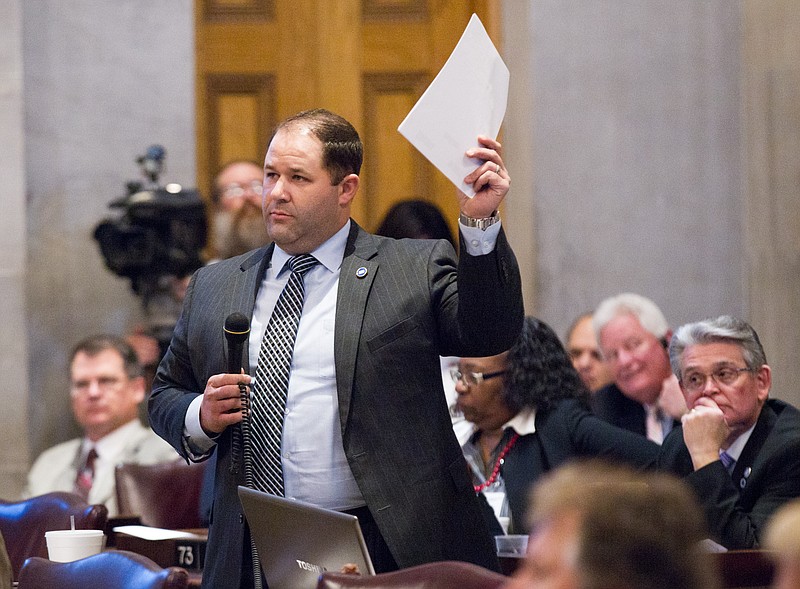NASHVILLE -- For most of this year's legislative session, Sen. Todd Gardenhire, R-Chattanooga, and Rep. Andy Holt, R-Dresden, have worked together on a bill aimed at local governments' use of automatic traffic cameras.
Consider the partnership severed, thanks to Holt's work to sabotage Gardenhire's bill granting in-state tuition rates to some undocumented Tennessee students to attend public colleges.
The tuition equality bill passed the Senate last week but failed by one vote in the House on Wednesday, with Holt voting no. Inside the chamber watching the debate -- and Holt -- was Gardenhire.
Upset over Holt's vote, Gardenhire returned to the Senate where he began an effort to recall the traffic camera bill, which had already passed the Senate and was awaiting House action. That drew Holt over to the upper chamber.
"He asked me what was going on and who was trying to kill his bill," Gardenhire said, adding that he made clear to Holt that the reason was "the vote tally on the in-state tuition."
Gardenhire said Holt scrambled back to the House and pushed for a vote on the camera bill. In the Senate version, provisions barring all city use of the cameras were scrapped. Instead, it applied only to speed cameras, but exempted Chattanooga's cameras along the deadly "S" curve section of Hixson Pike and in school zones across Tennessee.
House members had similar amendments, but Gardenhire said Holt was hoping to force the bill to a conference committee, where the original ban on all cameras could be restored.
Instead, Holt accepted the Senate version, which passed.
"Either way, I won," Gardenhire said.
Also in the General Assembly on Wednesday:
* Senators sent a bill imposing a 48-hour waiting period and mandatory counseling for women seeking an abortion to Republican Gov. Bill Haslam, who is expected to sign it into law.
Senators voted 24-2 to concur with a House provision adding a "severability clause" that says if any provision is found unconstitutional, the remaining portions of the bill remain in effect.
The bill requires a woman to wait 48 hours between her first visit to an abortion provider and the procedure. It also requires physicians to tell women about the probable gestational age of the fetus; that the baby may be capable of survival if it is at least 22 weeks old and that the physician legally is required to try to preserve the life of a child prematurely born alive during an abortion.
Other information regards services and alternatives to abortion, including adoption; the medical benefits and risks of undergoing an abortion or continuing the pregnancy to term, and a general description of the method to be used.
It's one of two abortion bills passed this session after Tennessee voters last year approved an amendment to the state Constitution stripping out abortion provisions.
* A bill sponsored by Rep. Mike Carter, R-Ooltewah, to allow residents of sections of cities to initiate referendums to "de-annex" themselves was deferred by House Finance Committee members to 2016.
Carter pushed the bill as a follow-up to his landmark 2014 law that eliminates cities' ability to annex by ordinance in favor of annexation by referendum. But the de-annexation referendum bill ran into stiffer opposition.
* Under another Carter bill, police will have to wait until suspected drunken drivers are actually convicted to seize and sell their vehicles under a bill now headed to Haslam.
"We'll change the seizing and the selling of the vehicle from the date of the arrest to conviction," said Carter, an attorney and former General Sessions judge in Hamilton County.
The bill was previously passed in the Senate.
* The Senate gave final approval Wednesday to a compromise on the state's Common Core standards for math and English language arts.
Voting 27-1, senators sent to Haslam a bill that enshrines Haslam's current review process, adds a 10-member committee to ride herd on changes and later repeals and replaces the Common Core standards with the revised standards.
The Senate bill was sponsored by Sen. Mike Bell, R-Riceville. The House passed the bill, the result of efforts made by Rep. Billy Spivey, R-Lewisburg, to find a solution bedeviling the GOP-dominated Legislature for three years, on a 97-0 vote Tuesday.
* Lawmakers voted to raise the income thresholds for people aged 65 and up who pay the state's Hall income tax.
Income subject to the Hall tax includes stock dividends and certain interest income. But people who are 65 and older are exempt if their incomes are under a threshold. Senate Bill 32, which won House approval 89-4 on Wednesday, set those thresholds at $37,000 for single filers and $68,000 for joint filers, effective with tax year 2015. The state Department of Revenue says 1,941 single filers and 2,598 couples will avoid the tax as a result of the bill.
The Hall tax exempts the first $1,250 in taxable dividends and interest for single filers and $2,500 for joint filers. Those exemptions are not affected by the bill now on its way to the governor.
* Tennessee lawmakers are expected to get new digs in 2017, with the General Assembly slated to move from the Legislative Plaza and War Memorial Building.
Their landing place will be the nearby Cordell Hull State Office Building, which is scheduled to undergo a $44 million renovation.
House Speaker Beth Harwell, R-Nashville, said the move makes sense because repairs to the Legislative Plaza and War Memorial buildings are estimated at some $55 million.
Haslam had planned to tear down the historic Cordell Hull building until an uproar among Nashville preservationists and historians forced him to back off.
Staff writer Andy Sher and Rick Locker of the Commercial Appeal contributed to this report.
